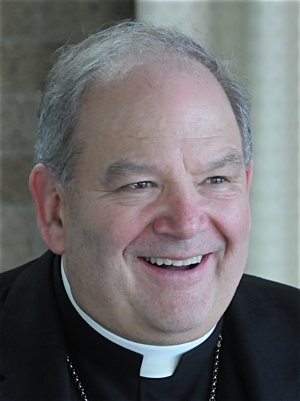 Before he joined seminary, Archbishop Bernard Hebda spent a year working at the largest law firm in Pittsburgh, Reed Smith.
Before he joined seminary, Archbishop Bernard Hebda spent a year working at the largest law firm in Pittsburgh, Reed Smith.
“I loved it,” he said — a fact that surprised him, since even in law school he hadn’t imagined working as a lawyer, although he was intrigued by the subject matter.
He first began considering law while an undergraduate student at Harvard University in Cambridge, Massachusetts, where he majored in government with a focus on international relations.
Although a vocation to the priesthood had been in the back of his mind since childhood, he decided to forgo seminary and attend Harvard in case the priesthood wasn’t God’s plan for him.
With the exception of a monthlong study trip to Europe, Archbishop Hebda hadn’t spent much time outside of Pittsburgh, and he relished learning alongside students from around the world.
“I found the academic environment very stimulating at Harvard,” he said. “I met some incredibly bright peers and really met some great friends and . . . found my world broadened.”
Thinking that God was calling him to public service, he developed an interest in international organization and imagined a career in international development or peace-building efforts.
“I was very interested in Africa and some of the conflicts that were going on there,” he said, “and so I thought I’d like to do something for an international agency like the United Nations.”
He chose to attend Columbia Law School in New York because of its close proximity to the United Nations, and planned to study international law. Along the way, he found he enjoyed studying things his classmates found challenging, such as contracts, torts and constitutional law. To finance law school, he worked summers at Reed Smith.
“The longer I was in law school, the more I thought I could see myself being a lawyer in Pittsburgh or wherever, and having a family and being very involved in the Church, doing something positive in that way,” he said.
God had other plans, and he left Reed Smith for the seminary in 1984. The Church, however, made use of his interest in law by sending him to Rome to study canon law. He earned a licentiate in 1990. From 1992 to 1996, he served as a judge for the tribunal for the Diocese of Pittsburgh before returning to Rome to work in canon law at the Vatican, a role he held until being named bishop of Gaylord in 2009.
His legal background has been “really helpful,” he said, in his work as apostolic administrator of the Archdiocese of St. Paul and Minneapolis, which declared bankruptcy in January 2015 due to mounting claims of clergy sex abuse, and has faced related civil and criminal charges. His experience means he understands the legal vocabulary and has “a real confidence that our legal system helps us to come to the truth.”
His canon law background is helpful, too, said the archbishop, who loves to read John Grisham’s legal thrillers.
“I’d already been reflecting on where those areas are where canon law and civil law overlap, and where there might be some opportunities for action on the part of the Church,” he said. “I think it’s basically a respect for rights; I think any law student develops that. You have the sense that you have to be willing to defend the rights of anybody who’s involved. And so often, it really means being able to stick up for what you believe and who you are.”



